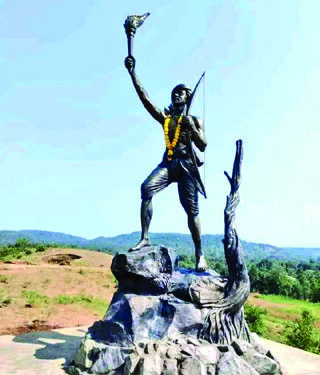navjeevanexpress.com presents this article for its discerning readers as part of its efforts to educate them on the sacrifices of all freedom fighters: R Arivanantham, Executive Editor.

RAMYA
Birsa Munda was an Indian freedom fighter, religious leader and folk hero hailing from the Munda Tribe of the Chhotanagpur Plateau area. His spirit of activism is remembered to be a strong mark of protest against British rule in India. He was a spearhead behind the Millenarian movement that arose in the Bengal Presidency (Present-day Jharkhand).
Anti–missionary and anti–government programmes of Birsa Munda
Born on 15 November 1875 in Ulihatu in Bengal presidency now in the Khunti district of Jharkhand. He was named after that day according to the then prevalent Munda custom. He received his early education at Salga under the guidance of his teacher Jaipal Nag. He spent his childhood surrounded by Christian missionaries, whose main mission was to convert as many tribal people into Christians as possible. He was advised by his teacher to enroll in German Mission School, but to get admitted, Munda was forced to convert to Christianity. He was renamed as Birsa David and later to Birsa Daud after the conversion. Birsa left the German Mission School after studying for a few years. During the period 1886 to 1890, Birsa Munda spent a large amount of time in Chaibasa, Jharkhand which was close to the centre of the Sardars had a strong impact on the mind of the young Birsa, who soon became a part of the anti–missionary and anti–government program.
Read Also:
President to pay tributes to Bhagwan Birsa Munda at Ulihatu on Janjatiya Gaurav Divas
Tribal reformer
From Vaishnav Monk, Birsa learned about Hindu religious teachings and studied the old scriptures along with the Ramayana and Mahabharata. Birsa wanted to reform the tribal society and so, he urged them to let go of beliefs in witchcraft and instead, stressed on the importance of prayer, staying away from alcohol, having faith in God and observing a code of conduct. Birsa Munda was a founder of a new religion called Birsait. The religion believed in One God and encouraged them to revert to their original religious beliefs. People started referring to him as an economical religion healer, a miracle–worker and preacher. People belonging to Oraon and Munda became convinced Birasities. People started referring him ‘Dharti Abba or Father of Earth’.
The Great Tumult
Through his religion, Munda also preached a strong Anti–British sentiment and mobilized thousands of tribal folk to form Guerrilla armies to attack the Raj. His slogan threatening the British Raj is still remembered today in the states of Odisha, Bihar, West Bengal and Madhya Pradesh. The slogan was ‘Rajsetarjana, Maharani raj tundujana’ which means ‘Let the Kingdom of the Queen be ended and our kingdom will be established’. Birsa started a movement called ‘Ulgulan’, or ‘The Great Tumult’. His struggle against the exploitation and discrimination against tribals led to a big hit against the British government in the form of the Chhotanagpur Tenancy Act being passed in 1908. The act restricted the passing on land from the tribal people to non–tribals. As his awareness grew of British atrocities, Birsa Munda also participated in anti–missionary and anti–establishment activities between 1886 – 1890 in Chaibasa. He was arrested by the British police on March 3, 1900. Birsa Munda died young at 25, in Ranchi on June 9 the same year.
Birsa’s achievements as a young tribal revolutionary has been continued to be celebrated over decades. Jharkhand was carved out of Bihar on his birth anniversary on November 15, 2000.
More than a century later Munda’s legacy still lives on
In the year 1988, a stamp was launched to honor him. More than a century later Munda’s legacy still lives on, especially in Bihar, Jharkhand and parts of Karnataka and Odisa. The entire state of Jharkhand has memorials named after him such as Brisa Munda Airport Ranchi, Birsa Institute of Technology Sindri, Birsa Munda Tribal University, Birsa Agricultural University, Birsa College Khunti, Birsa Munda Athletics Stadium, Birsa Munda Central Jail. He is the only Tribal leader whose portrait hangs in the Central Hall of Indian Parliament as a mark of honor, which was unveiled by the speaker of the Lok Sabha, Dr Bal Ram Jakher on 16 October 1989. It was donated by the Birsa Munda statue committee, Rourkela. Ulgulan is a proposed 150-feet tall statue of Birsa Munda to be built in Jharkhand (NH 33 – Ranchi – Jamshedpur national highway near Bundu) with stones collected from household in the region. Ulgulan, the annual college festival of the National University of Study and Research in Law in Ranchi is inspired by the freedom struggle of Birsa Munda. His birth anniversary which falls on 15 November is still celebrated by tribal people in as far as Mysore and Kodagu districts in Karnataka and official function takes place at his Samadhi Sthal at Kokar, Ranchi, the Capital of Jharkhand.
Films, books bring alive Father of Earth
In 2004, a Hindi film, Ulgulan – Ek Krant (The Revolution) was made by Ashok Saran. In 2008, a Hindi film based on the life of Birsa, Gandhi Se Pehle Gandhi (Gandhi before Gandhi) was directed by Iqbal Durran, based on his own novel of the same name. Ramon Magsaysay Award Winner, writer Activist Mahasweta Devi’s historical fiction, Aranyer Adhikar (Right to the Forest, 1977), a novel for which she won the Sahitya Akademi Award for Bengali in 1979 is based on his life and the Munda Rebellion against the British Raj in the late 19th century. Imagine, Birsa Munda was all of 25 when he died – yet, his impact has been so profound.
Birsa’s life was driven by poverty but he still set a powerful example for the youth to emulate in their pursuit of giving more to society than what is taken. He has been an astounding contributor to modern India but he has also unfortunately been relegated to the background in today’s times.
At the age of 25, Birsa managed to understand the pulse of his fellow tribal citizens. His vision for his Munda Community was to trace their roots and ethos back and as a result, a whole section of society benefitted.
(The author of this article Ramya is Assistant Professor & Tribal Researcher, Department of English, PKR Arts College for Women, Erode District, Tamil Nadu.)
Navjeevan Express (navjeevanexpress.com) invites articles from academicians to rekindle the flame of hope among youth so as to make India a developed nation as envisioned by Bharat Ratna Dr APJ Abdul Kalam. Articles can be sent to our e mail: navjeevanexpress@gmail.com, manickavasagam1959@yahoo.co.in










